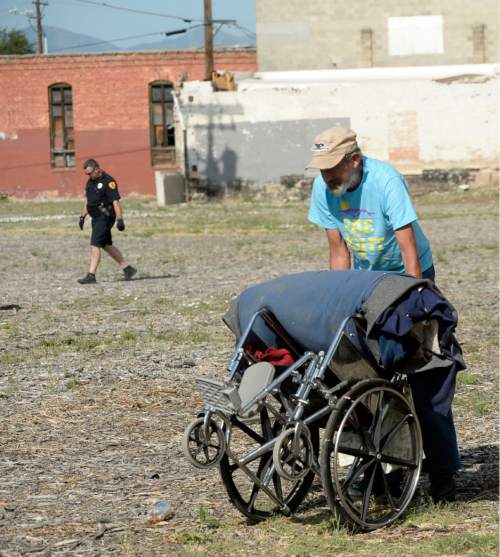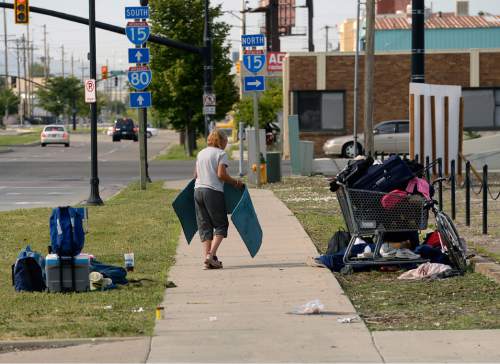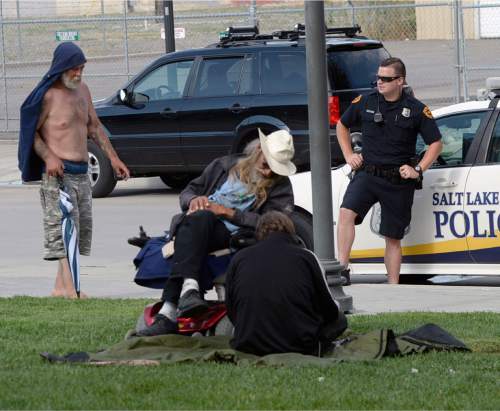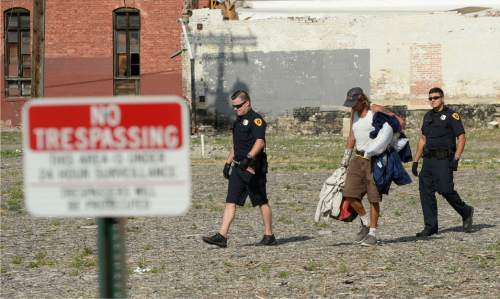This is an archived article that was published on sltrib.com in 2015, and information in the article may be outdated. It is provided only for personal research purposes and may not be reprinted.
It's not illegal to be homeless in Salt Lake City — but to some it feels that way.
The 500 West Commons — a strip of lawn and trees from 300 South to 400 South — looks to be the new Pioneer Park, where homeless people increasingly congregate and camp out.
After complaints from businesses and residents, police have coaxed homeless campers out of Pioneer Park. Meanwhile, the outdoor population along 500 West is growing.
Wednesday morning, there were about 200 people there, who appeared to have camped out the previous night.
Outreach teams from the Volunteers of America — Utah (VOA) canvassed the area Wednesday afternoon asking homeless people whether they knew of nearby services and why they chose the commons over The Road Home shelter at 200 S. Rio Grande St.
VOA's outreach activity attracted TV cameras and what appeared to be an increase in police presence.
By Thursday morning, there were far fewer campers on the commons.
Mark Isaksson, 45, said the police don't usually hassle the campers, even though a sign declares the commons closed to the public from 10 p.m. to 6 a.m.
"But yesterday, they were running us around all day," he said.
The sprinklers come on in the commons very early in the morning, he said. But even though his bedding got soaked, he prefers sleeping outside of the shelter.
Isaksson explained he is a recovering addict. "The shelter is infested with drugs and there's violence, too," he said. "You walk by and about a hundred guys are asking you white or black, white or black [for cocaine or heroin]."
A man who said his name is Lynn Jordan, 48, has been homeless for about two weeks.
He is having a difficult time adjusting, he said, noting that he doesn't like to be near the shelter because of the crowding and theft.
"This is crazy," he said of trying to find a place to sleep without being asked to leave by police. "You can't sleep under the bridge. You can't sleep anywhere. Why don't they just have a park where we can sleep?"
A spokeswoman for the police department said the homeless population does provide challenges. Although officers must sometimes ask campers to move, they don't arrest them.
"We in no way want to be rousting them and their belongings," said Christina Judd.
She added that the police department, in conjunction with service providers, is looking to fill gaps in shelter, health care and other issues faced by the homeless population.
Communication and information is a big challenge for a disconnected population. And many homeless people have no way of knowing what services are available, said VOA's executive director Kathy Bray. The organization's outreach teams act as "mobile information centers," she said.
"We're just trying to help these people find services," she said, "because we know they won't be here forever."
Beyond checking up on people they are familiar with and directing newcomers to services, VOA wants to make sure the mayor's commission on homeless services is hearing the voices of those people who would be their clients. That input should be considered carefully by policymakers.
Better solutions are coming for the homeless, said City Councilwoman Erin Mendenhall. The mayor's commission will make recommendations near year's end that likely will include upgrades to homeless services, she said.
But that will take money and Salt Lake City taxpayers cannot shoulder the brunt of what is a regional problem, Mendenhall said. It will take the effort of Salt Lake County and all of its 16 municipalities.









